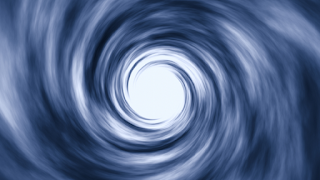NASA scientists have created a new animation, using the Discover supercomputer, that reveals what would happen when you dive into a black hole's "point of no return" event horizon.
Although the virtual video does not show a specific black hole, its size is approximately equivalent to the supermassive black hole located at the center of our Milky Way Galaxy. The project produced approximately 10 terabytes of data.
As the video begins and the “camera” approaches the void, a bright orange “accretion disk” can be seen, which is known as a hot disk of gas orbiting the black hole.
The accretion disk consists of a substance that emits energy when it falls into the black hole, whether it is gas, dust, or matter.
A thin photon ball, a thin ring of light, can also be seen forming near the black hole's "event horizon."
The term "event horizon" refers to the point where nothing, not even light, can escape.
The event horizon of the hypothetical black hole extends to a distance of about 25 million kilometers, or about 17% of the distance between the Earth and the Sun.
NASA revealed that the “virtual event” from the individual’s perspective, provided by the virtual “camera,” was greatly accelerated, reaching the speed of light by 60%. The camera is supposed to represent the astronaut's point of view if we can reach the black hole, which is currently impossible.
Xavier Calmette, professor of physics at the University of Sussex, said the black hole's gravitational force would become so intense, and "your body would stretch into a shape similar to that of a long spaghetti. I can't imagine this would be pleasant, it would happen fairly quickly, so if it's painful... "The pain is unlikely to last long."
Dr David L Clements, a senior lecturer in the Department of Physics at Imperial College London, said the "end would likely be quick" in the event of falling into a black hole.




Good
ReplyDeleteGood
ReplyDeleteGood
ReplyDeleteFalling into a black hole is the end of it all
ReplyDeleteInformative
ReplyDelete